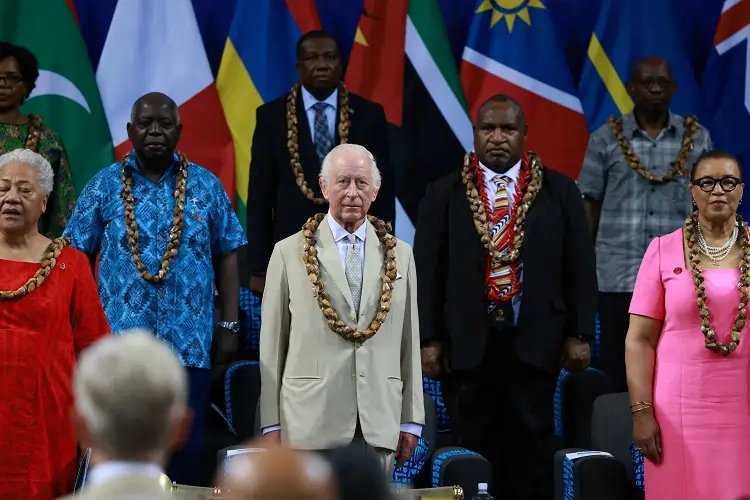King Charles acknowledges ‘painful’ slavery past as calls for reparations intensify


By James Redmayne and Alasdair Pal
APIA, Samoa (Reuters) – King Charles said on Friday the Commonwealth should acknowledge its “painful” history, as African and Caribbean nations push for reparations for Britain’s role in transatlantic slavery.
Representatives of 56 countries, most with roots in Britain’s empire, are attending the Commonwealth Heads of Government Meeting that began in Samoa on Monday, with slavery and the threat of climate change emerging as major themes.
“I understand from listening to people across the Commonwealth how the most painful aspects of our past continue to resonate,” Charles said in a speech to the summit.
“It is vital, therefore, that we understand our history, to guide us towards making the right choices in future.”
The demand for former colonial powers such as Britain to pay reparations or make other amends for slavery and its legacies today is a long-standing one, but has gained momentum worldwide, particularly among the Caribbean Community (CARICOM) and the African Union.
Opponents of reparations say countries should not be held responsible for historical wrongs, while those in favour say the legacy of slavery has led to vast and persistent racial inequality.
British Prime Minster Keir Starmer has rejected calls for reparations and ruled out apologising for the country’s historic role but said he was open to engage with leaders who want to discuss it.
The Guardian newspaper, citing a source from Starmer’s office, reported late on Thursday that the prime minister had “opened the door to non-financial reparations”, such as restructuring financial institutions and providing debt relief.
Starmer’s office did not immediately reply to a Reuters request for comment.
There are different types of reparations, from financial payments and apologies to technology transfer and educational programmes. CARICOM has its own reparations plan.
Bahamas Foreign Minister Frederick Mitchell told the BBC on Thursday the summit’s draft conclusion, expected to be published on Saturday, had paragraphs calling for a discussion on reparations.
If we say we want greater equality and equity in the world, the way to do this is to examine what and how reparations might manifest, rather than to shut down the conversation,” said Jacqueline McKenzie, a lawyer at London firm Leigh Day, where her team are investigating the potential for reparations claims.
From the 15th to the 19th century, at least 12.5 million Africans were kidnapped and forcibly taken by mostly European ships and merchants and sold into slavery.
Those who survived the brutal voyages ended up toiling on plantations in inhumane conditions in the Americas, while others profited from their labour.
“We have demonstrated an unparalleled ability to confound the painful history which brought us together and sit together as equals for 75 years,” Commonwealth Secretary-General Patricia Scotland, a British diplomat and lawyer who was born in Dominica, told the summit.
During the summit, member countries are also expected to sign the Commonwealth Ocean Declaration, that aims to boost financing to ensure a healthy ocean and fix maritime boundaries even if small island nations eventually become unliveable.
What the Ocean Declaration seeks to do and to say is that once your marine boundaries are fixed, they’re fixed in perpetuity,” Scotland told Reuters.
This is incredibly important because it will give real hope to many who are frightened and are feeling no one’s watching, no one’s listening, no one’s caring – and that’s not true.
More than half of the Commonwealth’s members are small nations, many of them low-lying islands at risk from rising sea levels caused by climate change.
“You come to this beautiful paradise, and then you realise that paradise is in danger,” Scotland said.
(Reporting by James Redmayne in Apia and Alasdair Pal in Sydney; Additional reporting by Catarina Demony in London; Editing by Lincoln Feast, Michael Perry and Alison Williams)
Reparations refer to compensation given for historical injustices, such as slavery, often involving financial payments or other forms of restitution to affected communities.
Climate change refers to significant changes in global temperatures and weather patterns over time, primarily driven by human activities such as burning fossil fuels.
Explore more articles in the Top Stories category











